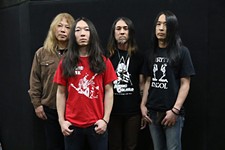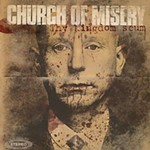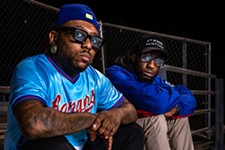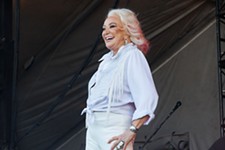The Gray Band
Life, death, doom: Church of Misery
By Raoul Hernandez, Fri., Jan. 14, 2011
A sonic hiss slithers poisonously from the right channel to the left and back again while guitar feedback balloons at an ear-piercing midpoint. As sirens of amplifier worship crescendo to a hemorrhage, a news bulletin from the 1970s tangles into the opener's audio barbed wire.
"Pensacola, Florida, police are questioning a man they say may be one of the worst sex murderers of all time. Police arrested the 31-year-old man after a high-speed chase Wednesday morning. He claims to be a Florida State University law student ..."
Drum and strum pound the proceedings to order with four introductory wallops, the news flash unfolding over the song's snaking stereo effects, now whipping into a frenzied loop.
"... Murder cases of at least 36 young women in California, Washington, Oregon, Utah, Colorado, and Michigan. He is also on the FBI's 10 Most Wanted List."
Drummer and guitarist sound off again.
"... Two counts burglary, two counts murder in the first degree, three counts attempted murder in the first degree. ..."
At the minute mark, swirling out of this auditory doom gale – another crashing intonation begun – one last voice breaks through.
"I'll plead not guilty right now," offers Ted Bundy.
Unleashed finally, a gargantuan beat clatters into an echoed metallic funk breakdown straight from the halls of Valhalla where John Bonham presides at the head of a long oaken table – splintering it. Erupting alongside avalanche guitars, which undercurrent a monstrously disfigured garage descendent of maybe Led Zeppelin's "No Quarter," a rabid man-bear bellows as if mortally challenged, unintelligible tongue absolutely frothing.
Heaving a tsunami of seminal, late-1960s UK heavyosity*, the band rears up behind the singer's expulsive roar, one line punctuated with what sounds like "I don't give a fuck!" only it's "phlaaauuuccck!" That precedes an exquisite turnaround of guitar/bass/drums exploding into the song's unmistakable refrain. Six thunderous minutes can't contain the frontman's bawl.
"I, motherfuckerrrrrrrrrrrrrrrrrrrrrrrrrrrrrrrrrrrrrrrrrrrrrrr."
Houses of the Unholy
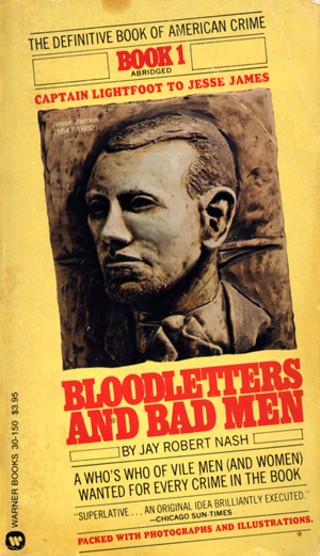
Travis held up a CD. January's snow flurries had melted into the first weekend of February 2010. Jason McMaster's local AC/DC mediums Broken Teeth had just finished demonstrating Viva la Rock, Fantastico! at both metalheads' West Anderson Lane headquarters, Encore Records & Video. Travis, Jason, Gary, Tom – Encore knows metallurgy (2008 "Best of Austin"). One store-brand upside-down bat T-shirt to rule them all: owner Chuck Lokey.
"Ever heard this?" repeated Travis.
"I worked that!" exclaimed my in-store rendezvous, Carl Schultz of Austin-based metallurgists Action! PR.
Church of Misery: Houses of the Unholy.
Fellow servant of Japanese psych-metal samurai Boris, Ghost, and Michio Kurihara – see "Mabuta no Ura," June 27, 2008; "Temple Stone," May 15, 2009; and "Your Satori Mind," July 23, 2010, respectively – my Encore A&R man offered me the disc along with several others. Skull Alcoholic: The Complete Solar Anus and particularly Eternal Elysium's Spiritualized D also proved to be lysergic mind-benders from the Asian theatre.
South by Southwest season at the Chronicle demands earbuds, so the following week, a pair of dead eyes bore into me from atop my computer keyboard, the back CD insert of Houses of the Unholy slicing a detail from a vintage black-and-white mug shot somehow glowing bronze in the winter daylight. Except for a rave-up of Sir Lord Baltimore's "Master Heartache," notable for opening early "heavy metal"-citing Kingdom Come, each song title listed a name in parenthesis after it – (Adolfo de Jesus Constanzo), (Albert Fish), (Richard Speck).
None spurred recognition.
Titles, they stuck: "Shotgun Boogie," "Blood Sucking Freak," "Born To Raise Hell." Work's tunnel vision turned Houses of the Unholy into blessed white noise, but the titles brought me back time and again, even though the songs themselves were cannonading in one ear hole and out the other. No way "Shotgun Boogie" in name alone doesn't pay off, I thought. Both barrels.
Slamming, shaking, beatdown from its titular razzle-dazzle right down to a final cock-and-discharge, "Shotgun Boogie," in fact, moves mountains. Likewise, the sunspot guitar solo emulsifying "Blood Sucking Freak" at the precipice of the singer's bloodcurdling confession ("I am a blood sucking freeeeeeeak!"), followed by the song's end charge, dizzies at eight minutes. "Born To Raise Hell," whose crime-scene sound sample tattoos the phrase's origin, burns rubber on a diamond chorus.
Closer "Badlands (Charles Starkweather & Caril Fugate)" bears total and no relation to Austinite Terrence Malick's 1973 big-screen stunner.
Starkweather – that name I knew.
The Gray Man (Albert Fish)
Austin Chronicle: Wikipedia says you're interested in serial killers.
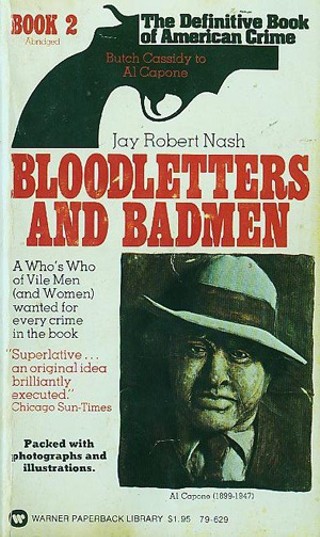
Slayer's Tom Araya: Yeah. But you know what? I wouldn't pay much attention to what's in Wikipedia. Anybody can write in that. But yeah, I have an interest in serial killers. My younger brother was reading a book on Albert Fish and he was telling me these interesting things about it. I was like, "Let me read that book when you're done with it" [laughs]. I read it, and I was like, "Damn." So you hit the bookstore and you look for other things that interest you. I came across a book about Ed Gein, and it just took off from there. Then out on the road, fans know you're into it. "Hey, you should read this book," and they'll hand you a book.
AC: Ever heard of a Japanese band called Church of Misery? Nearly all their songs are about serial killers. Their album Houses of the Unholy has a song about Albert Fish.
That song, "The Gray Man (Albert Fish)," sandwiched between "Shotgun Boogie (James Oliver Huberty)" and "Blood Sucking Freak (Richard Trenton Chase)," groans open a 1970 Black Sabbath pall as a voice in the mist and dead leaves reads a letter Fish wrote to the parents of one his victims. Then it gets heavy. Hideki Fukasawa lashes out a typically homicidal lyric until the song breaks down suddenly to a floor drum and riff for a few beats before Thomas Sutton ignites another nuclear guitar solo lurching the quartet into double time. Killing.
Exponentially extreme, 2007 documentary Albert Fish: In Sin He Found Salvation streams on Netflix. True crime, meet your kindly grandfather – the one eating your grandchildren. Warning meat lovers: A bacon cheeseburger (or bacon anything) might lose its all-American punch after 88 infernal minutes with Albert Fish.
Round the era Church of Misery unearths musically, Jay Robert Nash's 1975 paperback Bloodletters and Bad Men ("A Who's Who of Vile Men [and Women] Wanted for Every Crime in the Book") cataloged body counts going back some 300 years, from Mayflower arrival John Billington ("this country's first murderer") to Charles Manson, whose wood-carved approximation covers the series' third book. To a 10-year-old newspaper delivery boy ingesting news via a transistor radio dangling from his bike handlebars seven mornings a week in the suburbs of Northern California, its lurid litany stemmed from the aftermath of Manson.
Twenty years later, shortly after Jeffrey Dahmer was beaten to death in prison, Tokyo-based bassist Tatsu Mikami assembled his first Church of Misery. A 2-CD Early Works Compilation (1997-2000) kicks off with eight sludgy minutes of "Spahn Ranch (Charles Manson)," then dooms "Road to Ruin (Charles Whitman)," its newscast still chilling 45 years later:
"This is Neal Spelce and Red Rover on the University of Texas campus. This is a warning to the citizens of Austin – stay away from the university area. Traffic is now converging on this area. A boy riding a bicycle has been shot and seriously wounded. There has been a report of a policeman that has been shot."
Murder incorporated: "Room 213 (Jeffrey Dahmer)," "Son of a Gun (David Berkowitz)," "Where Evil Dwells (Richard Ramirez)," "Sick of Living (Zodiac)."
I fucking h-a-t-e serial killers.
I, Motherfucker (Ted Bundy)
Seldom do we choose who (or what) we love.
I met Greg Shaskan my first day of college in 1983. Instant kin, yin and yang; him a blond, blue-eyed Connecticut lacrosse obsessive and budding science major; and me, mostly brown, Left Coast tumbleweed and struggling English major (still). As Kurt Russell pronounces in Big Trouble in Little China, "we shook the pillars of heaven." Raged.
Lovesick for girlfriends back home, we drank ourselves maudlin to a heavy metal ballads tape I'd cut together on a boom box: AC/DC's "Ride On," Rush's "Losing It," Scorpions' "Holiday," Aerosmith's "Dream On," etc. Greg ranged far and wide after graduation – actor, sailor, pilot – but wherever he landed (England, Belize, the Philippines) he'd call for another copy of that tape. I kept it for him until the day of his funeral.
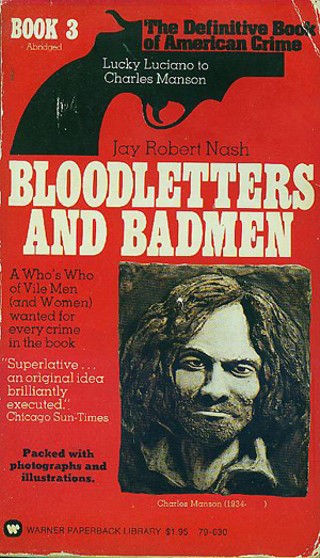
Not only did Greg eventually become a doctor, he came as close as humanly possible to his answer that initial week of school when asked what he wanted to be when he grew up. At the time of his death last year on the eve of Labor Day weekend, Greg, a NASA flight surgeon, was commuting from Houston (finally we lived in the same state) to Russia with his Challenger space shuttle charge, one of the astronauts. There, on the fast track to the final frontier, he who'd trained Navy Seals in martial arts while living on a tiny boat in San Diego – the healthiest mofo I ever knew – literally dropped dead outside a convenience store after a workout. Last we spoke, a year ago to the week of this "writing," his daughter Franchesca wasn't yet four hours old.
My intention was to send off that 27-year-old cassette lodged by Greg's side, but as fate would have it, the viewing of his body before the funeral didn't extend to the service itself. Afterward, outside church, his mother Kathy and I found each other. How to explain my offering?
A couple years after college, I crashed with Greg in an apartment two blocks off Times Square in Manhattan. My single memory of those six weeks is one night's voodoo ritual to The Doors. Greg walked Jim Morrison's talk. No metal head was he, but his fires burned tribal. To my everlasting incomprehension, his mom loves our tape.
L-o-v-e-s.
Bark at the moon, Greg.
"I, motherfuckerrrrrrrrrrrrrrrrrrrrrrrrrrrrrrrrrrrrrrrrrrrrrrr!"
Sick of Living (Zodiac)
Neighbors: The family friend who gave me Raymond Chandler's The Long Goodbye around the fifth grade later shared with me some of his life's work – tracking down the Zodiac killer for Naval Intelligence. David Fincher's 2007 film Zodiac doesn't match evidence burned in my memory.
My five minutes of body count curiosity ceased well before the American Psycho fetish. Hideki Fukasawa snarls English, in which sings Nobukazu Chow before him, and on Live at Roadburn 2009, so too huffs Yoshiaki Negishi, who exhorted Church of Misery's 2001 U.S. debut, Master of Brutality. Howl/shriek/moan – all vocalists are slave to Church of Misery's life-force superboogie. Obsession possessed me.
Master of Brutality: Out of print. Church of Misery's first proper tour outside Japan, DVD Live in Red, Euro Tour 2005: PAL format only. Singles, 12-inch splits, tapes – Charles Manson's "music" turns up more readily. The Second Coming: Holy Grail.
Rawer than Houses of the Unholy, like AC/DC's Powerage compared to succeeding "Mutt" Lange production Highway to Hell, COM's sophomore LP opens astride "I, Motherfucker." Fukasawa, guitarist Takenori Hoshi, bassist Tatsu Mikami, and drummer Junjy Narita hammer the gods as one fist, highlighted on "Shotgun Boogie" precursor "Filth Bitch Boogie (Aileen Wuornos)." Its killer's courtroom obscenities stoke a mad rhino rodeo, eight seconds later belonging to Charlize Theron in Monster.
A week before Christmas, a box arrived from Tokyo, ordered from COM's website. The return address read "Tatsu Mikami," and on the Live in Red DVD he'd converted for me, one credit told the tale: All songs © Tatsu Mikami. Church of Misery's sole original member goes by Tatsushito Mikami in his e-mail:
"Basically, when I started the band, I felt the serial killer theme fit the music perfectly. The topic and the tunes have a similar vibe. It can be a real inspiration, because once you start looking at quotes from killers lyrics start coming out naturally."
Life & death. Naturally.
(*"Heavyosity": See Woody Allen's Annie Hall.)






